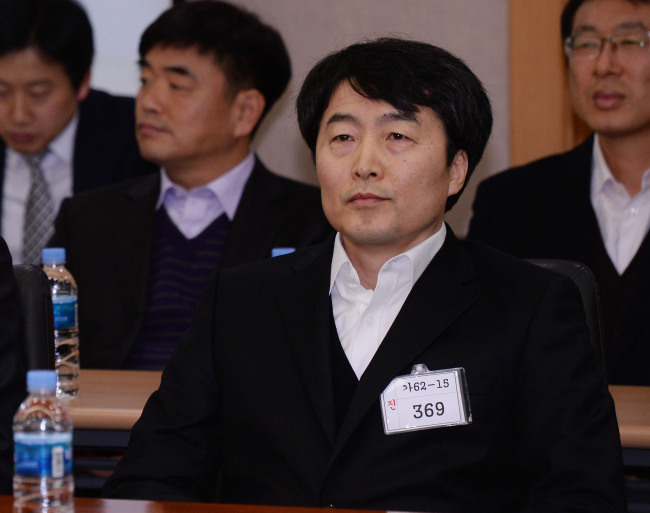Left-wing lawmaker sentenced to 12-year prison term in treason case
First treason suit in 34 years will likely affect the Constitutional Court’s ruling on the government’s petition to dissolve the UPP
By Suk Gee-hyunPublished : Feb. 17, 2014 - 20:21

Opposition lawmaker Lee Seok-ki was sentenced to 12 years in prison on Monday on conviction of plotting and instigating an armed rebellion against the South Korean government.
Lee, the first to face treason charges in 34 years, was also found guilty of violating the National Security Law.
In addition to the prison term, the 52-year-old lawmaker, affiliated with the minor opposition Unified Progressive Party, received a 10-year suspension of his civil rights after release.
“It has been acknowledged that Lee led the Revolutionary Organization, a secret anti-government group established to overthrow the government since March 2013,” Judge Kim Jeong-woon of the Suwon District Court said in the ruling.
Lee’s six fellow defendants were sentenced to prison terms ranging from four to seven years.
Lee’s lawyer told reporters that they would appeal.
Lee was arrested last September on charges of plotting an armed revolt and leading a pro-North Korea group called the Revolutionary Organization.
In private late-night meetings held in May, the lawmaker allegedly told his followers to arm themselves and to attack any key facilities in the event of a war.
The judge said that they breached the anti-communist law by singing a North Korean propaganda song during their political gatherings last year. The court also accepted the prosecution’s charge that Lee possessed nearly 190 documents and films expressing Pyongyang’s political and ideological views.
Prosecutors have demanded a 20-year prison term for Lee and 10 to 15 years for other UPP members.
The defendants have denied the allegations calling the investigation a “witch hunt.”
“Today is the most humiliating day of the South Korean judiciary’s history. This is clearly a political trial that turns the clock back to 40 years ago,” the UPP said in a statement.
The main opposition Democratic Party also expressed regret over the court’s decision.
“The ruling is out of step with the times and common sense. We’ll keep watching the development of the case throughout future trials,” DP chief spokesman Lee Yoon-suk said in a statement.
The ruling Saenuri Party, on the other hand, welcomed the court’s decision saying that it hopes the case will become “a milestone that brushes off (ideological) conflict in society and reminds people of constitutionalism.”
Observers say the verdict would likely affect the Constitutional Court’s ruling on the government’s petition to dissolve the UPP, which is accused of pro-North activities.
If the Constitutional Court concludes that the UPP is a pro-communist group, it will become the first political party to be forcefully dissolved since 1958. At the time, the Progressive Party led by Cho Bong-am, a strong challenger to then-President Syngman Rhee, was disbanded after he was arrested on charges of espionage.
In August last year, the National Intelligence Service raided Lee’s office in an investigation into the RO meetings.
Following the probe, a whistleblower provided local news outlets several recorded files of the RO members discussing acts of treason, including Lee ordering his followers to prepare for a war, “politically and militarily.”
In September, the spy agency arrested Lee at the National Assembly.
The 23 UPP members who assaulted police officers during Lee’s arrest are also set to stand trial.
It is the second time Lee has been charged for crimes against the state. In 2002, Lee was sentenced to two years and six months in prison for playing a part in a pro-North Korea organization, but later released on a presidential pardon.
He was elected to the National Assembly on a proportional representation ticket in the 2012 general election.
By Suk Gee-Hyun (monicasuk@heraldcorp.com)




![[Herald Interview] 'Amid aging population, Korea to invite more young professionals from overseas'](http://res.heraldm.com/phpwas/restmb_idxmake.php?idx=644&simg=/content/image/2024/04/24/20240424050844_0.jpg&u=20240424200058)












![[KH Explains] Korean shipbuilding stocks rally: Real growth or bubble?](http://res.heraldm.com/phpwas/restmb_idxmake.php?idx=652&simg=/content/image/2024/04/25/20240425050656_0.jpg&u=)

